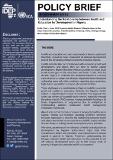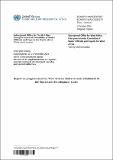| dc.description.abstract | The capitalist economy of colonial Zimbabwe whose objective is the production of maximum surplus value to be appropriated by the international and settler bourgeoisie is a product of British colonial imperialism which was an effort by Britain in the 19th century to resolve her socio-economic crisis caused by the sharpening of contradictions between labor and capital. These contradictions were the result of exploitation in that country. The establishment of capitalist economy in colonial Zimbabwe can be dated as far back as I890 when the British colonialists, under the leadership of the British South Africa company, whose shareholders were all British, through force of arms created peripheral capitalism in Zimbabwe. With this short introduction it is clear that the colonial state of Zimbabwe was decisive in creating and developing capitalist economy, its intervention in the economic affairs even led to the development of the African working class which in turn provided a market for consumer goods and agricultural produce. The emergence of the African working class is one of the factors which influenced the development of agrarian capitalist mode of production in the settler agricultural sector. Settler farmers began to produce large quantities of maize so as to supply a market created by African workers. | en |
| dc.title | Capitalist economy of colonial Zimbabwe | en |
| uneca.subject.fulltaxonomy | UNBIS::ECONOMIC DEVELOPMENT AND DEVELOPMENT FINANCE::ECONOMIC CONDITIONS::HIDDEN ECONOMY | en |
| uneca.subject.fulltaxonomy | UNBIS::ECONOMIC DEVELOPMENT AND DEVELOPMENT FINANCE::ECONOMIC CONDITIONS::HIDDEN ECONOMY | en |
| uneca.subject.fulltaxonomy | UNBIS::ECONOMIC DEVELOPMENT AND DEVELOPMENT FINANCE::ECONOMIC CONDITIONS::HIDDEN ECONOMY | en |
| uneca.subject.fulltaxonomy | UNBIS::ECONOMIC DEVELOPMENT AND DEVELOPMENT FINANCE::ECONOMIC CONDITIONS::MARKET ECONOMY | en |
| uneca.subject.fulltaxonomy | UNBIS::ECONOMIC DEVELOPMENT AND DEVELOPMENT FINANCE::ECONOMIC CONDITIONS::MARKET ECONOMY | en |
| uneca.subject.fulltaxonomy | UNBIS::ECONOMIC DEVELOPMENT AND DEVELOPMENT FINANCE::ECONOMIC CONDITIONS::MARKET ECONOMY | en |
| uneca.subject.fulltaxonomy | UNBIS::INDUSTRY::INDUSTRIAL SECTOR | en |
| uneca.subject.fulltaxonomy | UNBIS::INDUSTRY::INDUSTRIAL SECTOR | en |
| uneca.subject.fulltaxonomy | UNBIS::INDUSTRY::INDUSTRIAL SECTOR | en |
| uneca.subject.fulltaxonomy | UNBIS::INDUSTRY::INDUSTRIAL DEVELOPMENT SUPPORT SERVICES::MULTINATIONAL INDUSTRIAL PROJECTS | en |
| uneca.subject.fulltaxonomy | UNBIS::INDUSTRY::INDUSTRIAL DEVELOPMENT SUPPORT SERVICES::MULTINATIONAL INDUSTRIAL PROJECTS | en |
| uneca.subject.fulltaxonomy | UNBIS::INDUSTRY::INDUSTRIAL DEVELOPMENT SUPPORT SERVICES::MULTINATIONAL INDUSTRIAL PROJECTS | en |
| uneca.subject.fulltaxonomy | UNBIS::GEOGRAPHICAL DESCRIPTORS::AFRICA::ZIMBABWE | en |
| uneca.subject.fulltaxonomy | UNBIS::GEOGRAPHICAL DESCRIPTORS::AFRICA::ZIMBABWE | en |
| uneca.subject.fulltaxonomy | UNBIS::GEOGRAPHICAL DESCRIPTORS::AFRICA::ZIMBABWE | en |
| uneca.creatorCorporate.fulltaxonomy | Corporate Authors::United Nations. Economic Commission for Africa. African Institute for Economic Development and Planning(IDEP) | en |
| ags.creatorCorporate | United Nations. Economic Commission for Africa. African Institute for Economic Development and Planning(IDEP) | en |
| ags.subjectThesaurus | ZIMBABWE | en |
| ags.subjectThesaurus | ZIMBABWE | en |
| ags.subjectThesaurus | ZIMBABWE | en |
| ags.subjectClassification | 02.02.00 ECONOMIC CONDITIONS | en |
| ags.descriptionNotes | Includes Bibliography references | en |
| ags.publisherPlace | Dakar | en |
| ags.publisherName | UN. IDEP | en |
| dc.date.accessioned | 2019-08-27T09:16:10Z | |
| dc.date.available | 2019-08-27T09:16:10Z | |
| dc.date.issued | 1977-06 | |
| dc.identifier.uri | https://hdl.handle.net/10855/42460 | |
| dc.format.extent | 28 p.:ill. | |
| dc.language | eng | |
| dc.type | Working paper | |
| uneca.workflow.processed | true | |
| ags.creatorPersonal | Nyathi, Vunguza M. | |
| ags.availabilityNumber | 1977 | |
| ags.availabilityNumber | b11963025 | |
| ags.availabilityLocation | IDEP | |
| ags.rights.termsofuse | public | |
| ags.RN | CS/2796 | |
| ags.JN | b11963025 | |
| uneca.language.supported | en | |




